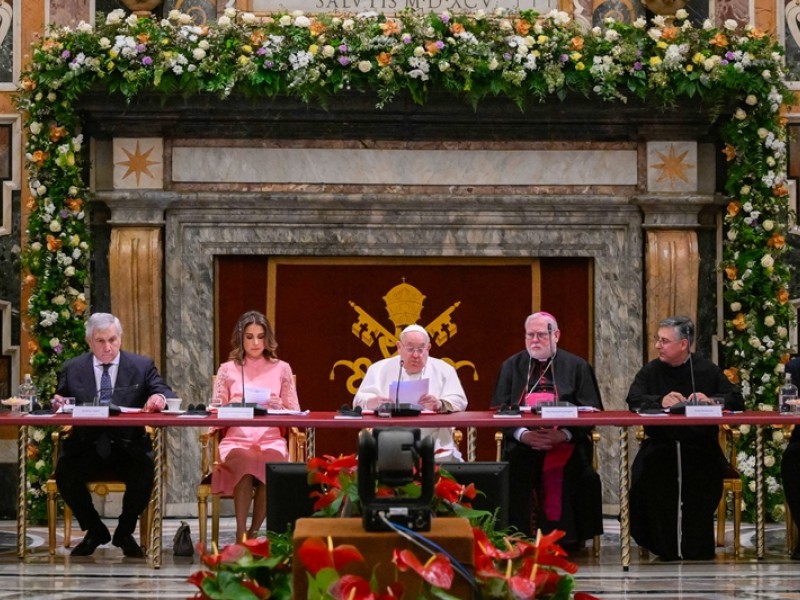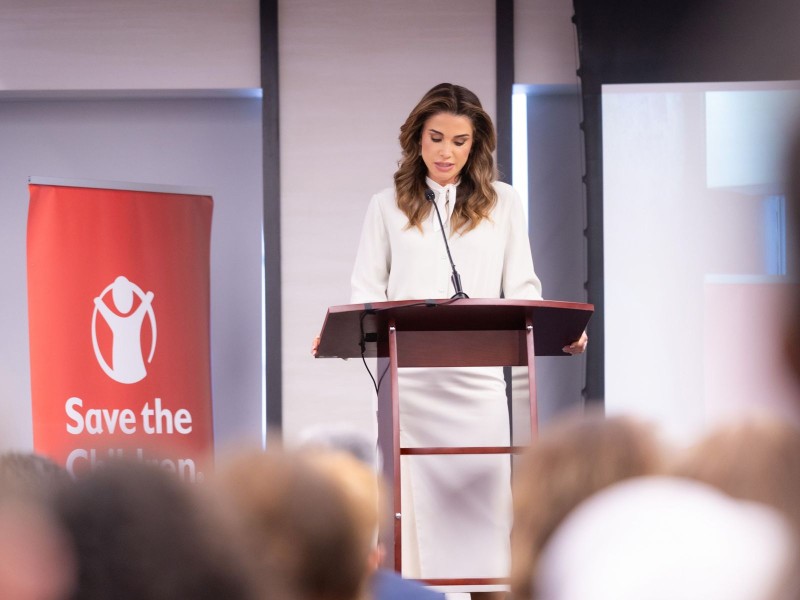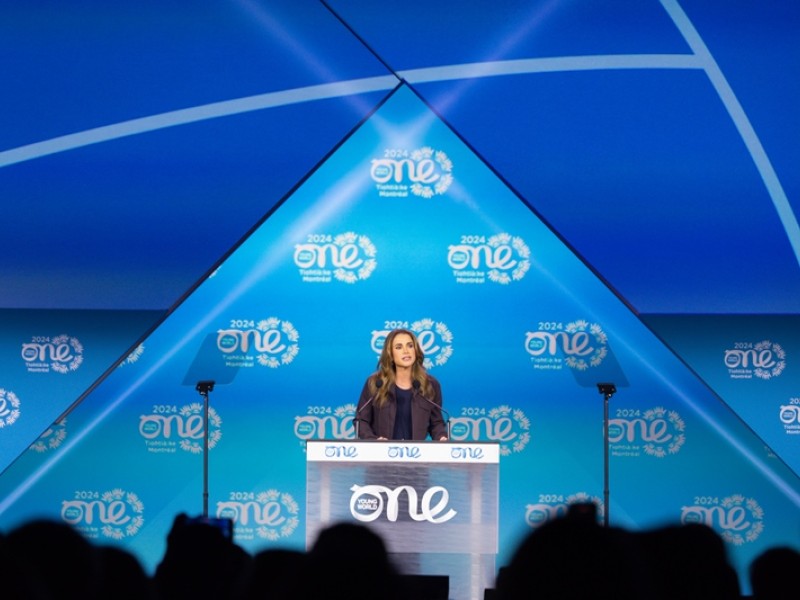Queen Rania's Speech at Harvard Univeristy's John F. Kennedy School of Government - Boston, USA
"Thank you very much Dean Ellwood, Mr. White…
Let me begin by saying it is wonderful to be with you all in Harvard tonight. It is always a pleasure to visit the US, especially in the midst of such a lively and competitive election season. The tension is tremendous…the atmosphere is electric…the whole country-- the whole world-- is on the edge of their seats… trying to predict the winner. Will it be Melinda, Lakisha or Blake?! The new American Idol.
No, seriously…would you like a speech or a song?
I have to say, that I would rather be graded by Dean Ellwood than Simon Cowell any day!
I am honored to be here. Indeed, honored to be back in Harvard… because eight years ago, I joined my husband His Majesty King Abdullah here for his very first address before an American university audience.
We were both deeply moved when, to mark the visit, the Kennedy School announced a permanently endowed professorship in honor of his late Majesty King Hussein… and a fellowship program to help young Jordanians follow the path of public service that King Hussein personified. We value and appreciate Harvard’s support as we build a Jordan that is modern, open-minded, and engaged in the world.
But I also remember my last visit to Cambridge because of the questions the students asked my husband after his speech. As you might expect, the majority were on the challenges of the Middle East. But one curious student wanted to know how my husband reconciled his Western education with the reality of being a king.
And without hesitation, my husband replied, “If I start to think that I’m a king, then I’ve got a problem.”
Like my husband, I am sure you know that genuine leadership takes more than a fancy title.
Being a good leader takes judgment. Vision. Courage to do the right thing. It takes keen instincts… and the kind of expert knowledge you have honed at the Kennedy School.
But leadership can not come just from the head. It must come from the heart as well. Because every policy, great or small, has a person at the end of it. Not just an anonymous stranger, but somebody’s mother… or best friend… or son. Someone who has the same rights and dignity and worth as you and me.
It may sound obvious. Yet it is all too easy to lose sight of in our fast-paced world… where so many challenges are so immense, so intractable, so entrenched. It is all too easy, as experts, to approach tough problems with our technocratic tools… and to debate complex issues on an analytical level, far above the ground where people actually live.
But as a result, there is sometimes something missing in our global discourse. The moral language of the conscience. The emotional conversation of the heart. The humanitarian perspective that helps us to see through another person’s eyes... and to empathize – person to person… neighbor to neighbor… us to them.
The great moral leaders of the 20th century understood the need for such empathy. In addressing the great injustices of their time – such as racism… apartheid… and exclusion – they appealed not only to logic but to simple human values like acceptance and love.
And crucially, each of them underscored our duty to look out for one another… and the fundamental dignity that joins each member in the family of humankind.
I think of Gandhi, whose creed of nonviolence sparked a global moral reckoning, and who taught that “the best way to find yourself is to lose yourself in the service of others.”
Or Martin Luther King, who called for “a genuine revolution of values”… “a worldwide fellowship that lifts neighborly concern beyond one’s tribe, race, class, and nation”
Or Nelson Mandela, who walked away from 27 years of imprisonment… unbroken, unbowed, extending a hand of reconciliation, not revenge.
Or Mother Teresa, who cared for the poorest of the poor in the slums of Calcutta, believing in the word of St. John -- that you cannot love God whom you do not see, if you do not love your neighbor with whom you live.
I believe we must weave that same spirit of caring throughout our public discourse – and ensure that we give priority to humanitarian values and concerns.
And it may sound soft – but I hope Professor Nye will attest that “soft” can be powerful!
Indeed, I believe that explicit recognition of our common humanity is an indispensable condition for peace and progress around the globe.
This is especially true when we look at the tensions between the Muslim world and the West, which for us in Jordan is not an abstraction, but a difficult and daily reality.
More than 40 years ago, Martin Luther King described what he called a great “world house.” In this house, all of humanity would have to learn to get along, because we can no longer live without each other.
But let us think, for a moment, of the house our troubled world inhabits today. To be honest, sometimes it feels more like a row of bunkers than a home. The East has occupied one room and the West is in another. And though the landscape outside their windows is the same, they see it very differently… because the windows themselves are tinted by each side’s experience and perspective.
You may have noticed I am using the word “they.” I am doing so deliberately. Because, if I may, I would like to try to speak as a neutral observer – as someone who has looked out of both sets of windows, and witnessed the contrast in views.
My aim is not to pass judgment. I do not want to tell you what to think – but rather, to highlight the diverging narratives…the different ways that East and West interpret reality. In particular, I would like to explore the gap in perceptions of the Middle East – where mutual failure to appreciate the other side’s point of view is a greater barrier to communication than speaking different languages.
The gap begins with a different sense of which parts of the landscape stand out. On the issue of Palestine, for example, looking out an American window, the first thing you might see is terrorist attacks against Israelis, and Israel’s paramount obligation to protect its people from harm. But looking through an Arab window, the image in the foreground is generations of Palestinian boys and girls growing up with no country, no rights, and no future – and that image has not changed for 50 years.
Looking out at Iraq, I think both sides would agree they see a mess. But where they differ, perhaps, is on the role of the American troops. From the Arab perspective, Iraq is a country whose people have suffered for decades – and whose lives have become even worse since the U.S. invasion and occupation. Through the Arab window, the American presence is unwanted… unwelcome… and unjust. However, when Americans look through their windows, most see U.S. troops performing honorably and heroically… doing their best – in very difficult circumstances -- to put a broken country back together.
Or, take the status of women. Through Western windows, Arab women may look passive and oppressed – from the way they dress to the role they play in the home and family unit. Eastern eyes, however, see Arab women taking an ever greater role in society – as doctors, lawyers, teachers, journalists, politicians, and entrepreneurs… and, at the same time, because Arab culture venerates the family, a woman’s predominant role in the household is seen as a source of strength.
And of course, interwoven with almost every issue is the way that each side views Islam.
For many in the East, Islam is a fundamental part of life – a guiding light that emphasizes mercy, charity, tolerance, and peace. But for many in the West, perceptions of Islam – what it stands for, what it means -- are bound up with the savagery of 9/11.
Thus, looking out the Western window, Islam seems like a threat – personified by terrorists who claim to act in God’s name. But looking out the Eastern window, Islam is under siege… distorted by violent extremists from within… and demonized from without.
Now, clearly, these are only generalizations. I do not claim to speak for the East, and certainly not for the West.
But I believe the perception gap is real. The gulf between narratives is wide – and only getting wider. And as a result, I fear a creeping affliction on both sides of what the philosopher William James called “the blindness in human beings” that prevents us from understanding the feelings of those “different from ourselves.”
I have four children. Their names are Hussein, Iman, Salma, and Hashem. And I must tell you, I do not want them to grow up in a house like this. I do not want them to inherit a divided, angry world, where East and West have hunkered down, alone in separate rooms.
And yet, I am hopeful.
Because our world house has a common room as well. It is a room where color, race, and creed do not get in the way – not because those things do not exist, but because they aren’t important. What’s important in the common room are the values that we share – the basic belief that each of us is worthy of respect.
In the common room, we can strive to understand one another’s perspective… to ask, and to listen… to share, and to trust… to assume the best from one another, not the worst.
In the common room, we can help one another to widen the view from the window – to examine the landscape from different angles, and in different shades of light, and to help one another see nuance and beauty in what might have seemed foreign or strange.
In the common room, we can be enriched by one another’s diversity. Because no matter where we come from… what we look like… how we dress… or to whom we pray… when it comes to what makes us laugh or cry… when it comes to what we dream of for ourselves and for our children… when it comes to how hard we work each day… we are usually more alike than we are different.
Now, you are probably thinking, “Any minute, she’s going to burst into Kumbaya.”
I will spare you that pleasure.
Because the common room is not a place for relaxation. It is not a place where we sit on the couch drinking lattes and watching LOST.
The common room is where people of goodwill come to work for the common good. To put an end to violence. To fight for peace. To build a world fit for children. To use our abundant resources and talents to eradicate global poverty… and turn national borders into global gateways that connect us, not keep us apart.
For when we start to identify with one another… and to relate to one another’s hopes and fears… we start to take responsibility for one another’s well-being. We see that none of us can be secure as long as any of us are insecure. That living in an interdependent world means being able to depend on one another.
And it seems to me there are a lot of Harvard people in the common room already. Crusading journalists. Courageous public servants. Pioneers of public health. The students and faculty who have been helping the citizens of New Orleans to rebuild their lives.
It seems to me this university is just the kind of place that can help turn the vision of the common room into a common way of life.
Some of you may recall when Conan O’Brian gave the class day address in 2000. And he warned the graduates they were in for a lifetime of, “And you went to Harvard?”
As Conan put it, “give the wrong amount of change in a transaction and it’s, ‘And you went to Harvard?’ Ask the guy at the hardware store how these jumper cables work and hear, ‘And you went to Harvard?’ Forget just once that your underwear goes inside your pants and it’s ‘And you went to Harvard?”
But ask yourselves, what does it really mean to have a Harvard degree?
The world already knows it means you are among the best and brightest. Indeed, those were the very qualities that got you here in the first place.
But let your ties to this great university mean something more than that.
Let your Harvard credential signify moral courage… and compassion.
Let it mean you approach a stranger with an open mind and an open heart.
Let it mean the spirit of the common room is with you, wherever you go.
And know the people of Jordan will always be ready to meet you there.
Thank you very much."
Featured
Queen Rania's official website
This website does not support old browsers. To view this website, Please upgrade your browser to IE 9 or greater
Your browser is out of date. It has known security flaws and may not display all features of this and other websites. Learn how to update your browser



